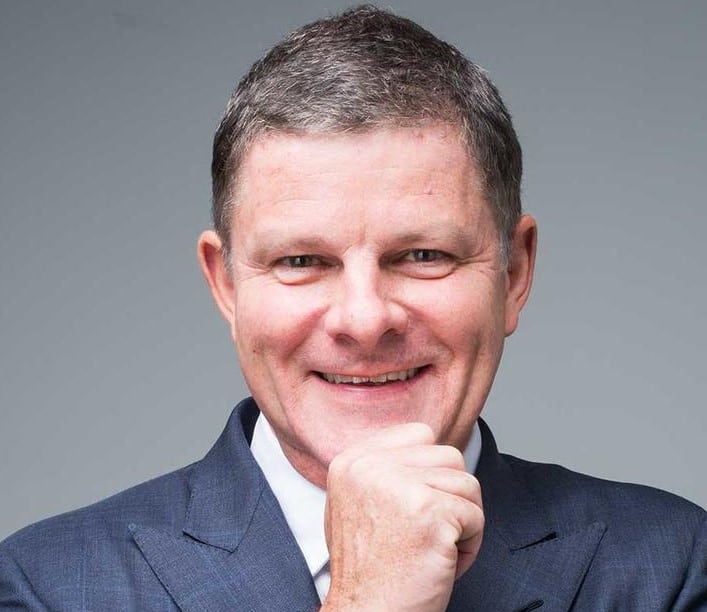For the metaverse to work, 6G, WiFi 6, and edge computing capabilities will be critical, according to Martin Tarr, Chief ICT Officer of du.
“The 5G network will not be enough to support the metaverse; there is a need for latency, lower latency, and thus, more bandwidth. Thus, to expand and upgrade the metaverse, 6G will be critical,” Martin Tarr, Chief ICT Officer at du, told TRENDS.
Defined as a virtual-reality space in which users can interact, the metaverse is evolving into an increasingly vast and rich ecosystem that comprises metaverse gateways, platforms, and infrastructures, as well as a variety of service providers to enhance the customer experience with identity, social, gaming, and economic services.

Telecom operators stand to benefit immensely by taking part in this world. Through this virtual environment, they can enhance customer experience, monetize investments through adjacent services and increase operational efficiency.
According to Tarr, telcos will be the entry point for the metaverse. This is not only due to connectivity requirements, but also customer relations.
Fibre and 5G provide the necessary connectivity for the metaverse to thrive upon. 5G is a critical enabler for the metaverse and its device and application developer ecosystem.
Tarr mentioned that telcos have begun delving into metaverse-based platforms that combine multiple technologies to bring the internet to life as 5G and metaverse go hand-in-hand. The metaverse phenomenon will give wireless operators the chance to boost 5G adoption and monetize their investments in place
Metaverse-enhancing features
There are several aspects that will enrich the metaverse world, according to Tarr. Blockchain, for example, shows promise because it allows businesses to create decentralized and transparent systems that provide digital evidence of ownership, digital collectability, value transfer, and interoperability.
Moreover, cryptocurrencies act as a medium of exchange to support the transfer of value between users while exploring and socializing in the 3-D virtual space.
“Seeing such possibilities, we can expect breathtaking innovation related to a blockchain-based metaverse in the future,” he told TRENDS.
Furthermore, artificial intelligence (AI) is also widely applicable in our day-to-day lives, from business automation to strategies and planning, facial recognition, and more. AI adds value to the metaverse, including faster data processing and management.
Next lies the Internet of Things (IoT) which, as a system, bridges the gap between our physical world and the internet, enabling the sending or receiving of data through sensors. For the metaverse, IoT collects from the physical world and renders items into virtual space, which increases the accuracy of digital representations.
“To further upgrade the metaverse ecosystem, IoT can use AI and machine learning technologies to manage the data it accumulates effectively,” he continued.
“With the growing telecommuting trend, more people rely on virtual spaces and digital modes of communication and the metaverse will bring their existing digital experience to the next level through a range of digital advantages capable of withstanding their interaction with this new immersive world. Thus, telco’s metaverse strategy will also improve consumer trust as they guide them in this new digital space,” he added.
A safe space
Just as the internet created safety, privacy, and security challenges, the metaverse will add even more challenges.
“Digital literacy and digital well-being are part of key strategic pillars at du, including the metaverse,” Tarr explained.
Tarr noted that ICT companies like du are working on making the metaverse a safe space with next-generation cybersecurity solutions next to the conventional phishing, malware, and hacking.
“Du is increasingly positioning itself as an intelligent product and services provider and thus can be a focal point for enterprises choosing to build centralized or decentralized metaverses, especially since the demand for a blockchain-powered metaverse has increased since industries already benefit from blockchain technology.”
“As cryptocurrency and non-fungible tokens (NFTs) are commonly used in the metaverse, they are more prone to cyber-attacks,” he said.
Cybersecurity solutions will improve the efficacy of analyzing user access and behavioral patterns on a broader scale and prevent the growing number of unknown dangers in the metaverse.
Additionally, the introduction of Web3, which intends to create a pro-privacy, anti-monopoly web using decentralization, can successfully solve the issue of data privacy by restoring users’ identities to their rightful owners while drastically minimizing hacks and data breaches.
Furthermore, blockchain and decentralized technologies are also considered to safeguard metaverse identity, which provides additional protection from fraud.
Future of the metaverse in the region
MENA’s virtual reality market alone is expected to reach $23 billion in 2028 against a global $800 billion market by 2024.
The UAE has been particularly ambitious in exploring metaverse technologies seeing a Metaverse Dubai project unfold, creating a platform incorporating NFTs, blockchain trading, and digital real estate for total immersion in the digital world.
“Metaverse participation is growing in the Middle East and GCC countries,” Tarr said. He expects the regulatory infrastructure surrounding the metaverse to expand across the region as it fosters digital transformation investments, citizen-centric e-government services, multi-cloud strategies, and more – setting the stage for a dynamic digital future in the GCC.
However, he noted that regulators must implement an effective governance structure to build accountability, transparency, and trust around this paradigm-shifting technology.
The metaverse brings up a whole new world of opportunities for businesses to engage in, which we anticipate will result in novel services and business models. Of course, not everything in the metaverse will be helpful for every firm, but there is little risk in exploring, he said.








